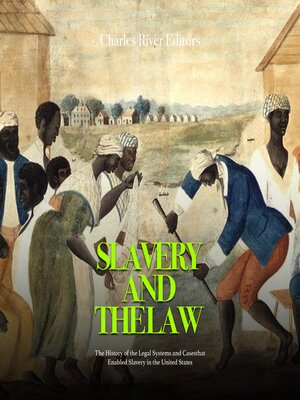Slavery and the Law
audiobook (Unabridged) ∣ The History of the Legal Systems and Cases that Enabled Slavery in the United States
By Charles River Editors

Sign up to save your library
With an OverDrive account, you can save your favorite libraries for at-a-glance information about availability. Find out more about OverDrive accounts.
Find this title in Libby, the library reading app by OverDrive.



Search for a digital library with this title
Title found at these libraries:
| Loading... |
Ultimately, while the institution of slavery existed, the principle of protecting individual property rights prevailed, alongside a necessary acknowledgment that slaves were property first and sentient human beings second. It also required a great deal of careful drafting and verbal contortions to construct the Constitution for the young republic that supported those principles of freedom and equality while at the same time facilitating the perpetuation of the "peculiar institution."
It was not until 1865, with the adoption of the Thirteenth Amendment, the instrument that abolished slavery, that any overt mention of slavery found its way into the Constitution. Before that, direct reference was always carefully avoided, although, at the same time, unmistakably alluded to. The document is filled with provisions specific to slavery, protecting and codifying it on a federal level, without anywhere making direct or overt mention of it. By 1788, when the Constitution of the United States was formally adopted, slavery had been a fact of life in the colonies for 169 years, since the first recorded arrival of black Africans in Virginia in 1619. At that time, around the institution, had evolved a system of laws that were derived in the main from English common law. The irony here is that the regime of English common law was at its root hostile to the principle of human bondage, had no tradition of slavery to call upon, and was desirous on the whole to avoid making any overt judgment or pronouncement on the matter. It, therefore, fell to colonial lawmakers to resolve that essential contradiction between treating Africans as either people or property or both. This tension remained in play throughout the era of slavery in English-speaking America until the matter was finally resolved by the outcome of the American Civil War.






